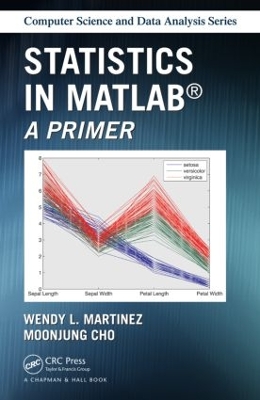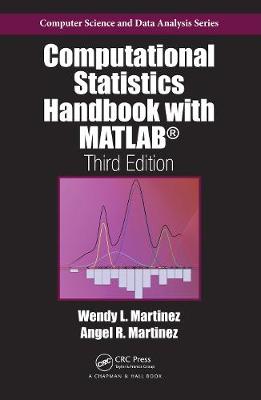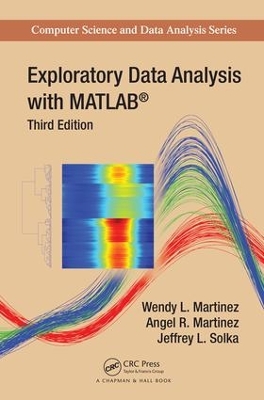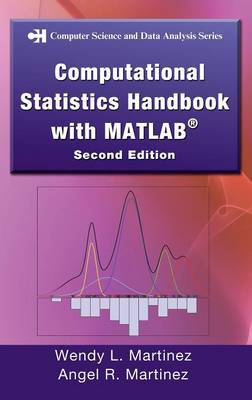Chapman & Hall/CRC Computer Science & Data Analysis
1 primary work • 4 total works
Book 22
Fulfilling the need for a practical user's guide, Statistics in MATLAB: A Primer provides an accessible introduction to the latest version of MATLAB (R) and its extensive functionality for statistics. Assuming a basic knowledge of statistics and probability as well as a fundamental understanding of linear algebra concepts, this book:
- Covers capabilities in the main MATLAB package, the Statistics Toolbox, and the student version of MATLAB
- Presents examples of how MATLAB can be used to analyze data
- Offers access to a companion website with data sets and additional examples
- Contains figures and visual aids to assist in application of the software
- Explains how to determine what method should be used for analysis
Statistics in MATLAB: A Primer is an ideal reference for undergraduate and graduate students in engineering, mathematics, statistics, economics, biostatistics, and computer science. It is also appropriate for a diverse professional market, making it a valuable addition to the libraries of researchers in statistics, computer science, data mining, machine learning, image analysis, signal processing, and engineering.
Computational Statistics Handbook with MATLAB, Third Edition
by Wendy L. Martinez and Angel R. Martinez
A Strong Practical Focus on Applications and Algorithms
Computational Statistics Handbook with MATLAB (R), Third Edition covers today's most commonly used techniques in computational statistics while maintaining the same philosophy and writing style of the bestselling previous editions. The text keeps theoretical concepts to a minimum, emphasizing the implementation of the methods.
New to the Third Edition
This third edition is updated with the latest version of MATLAB and the corresponding version of the Statistics and Machine Learning Toolbox. It also incorporates new sections on the nearest neighbor classifier, support vector machines, model checking and regularization, partial least squares regression, and multivariate adaptive regression splines.
Web Resource
The authors include algorithmic descriptions of the procedures as well as examples that illustrate the use of algorithms in data analysis. The MATLAB code, examples, and data sets are available online.
Exploratory Data Analysis with MATLAB
by Wendy L. Martinez, Angel R. Martinez, and Jeffrey Solka
Praise for the Second Edition:
"The authors present an intuitive and easy-to-read book. ... accompanied by many examples, proposed exercises, good references, and comprehensive appendices that initiate the reader unfamiliar with MATLAB."-Adolfo Alvarez Pinto, International Statistical Review
"Practitioners of EDA who use MATLAB will want a copy of this book. ... The authors have done a great service by bringing together so many EDA routines, but their main accomplishment in this dynamic text is providing the understanding and tools to do EDA.
-David A Huckaby, MAA Reviews
Exploratory Data Analysis (EDA) is an important part of the data analysis process. The methods presented in this text are ones that should be in the toolkit of every data scientist. As computational sophistication has increased and data sets have grown in size and complexity, EDA has become an even more important process for visualizing and summarizing data before making assumptions to generate hypotheses and models.
Exploratory Data Analysis with MATLAB, Third Edition presents EDA methods from a computational perspective and uses numerous examples and applications to show how the methods are used in practice. The authors use MATLAB code, pseudo-code, and algorithm descriptions to illustrate the concepts. The MATLAB code for examples, data sets, and the EDA Toolbox are available for download on the book's website.
New to the Third Edition
- Random projections and estimating local intrinsic dimensionality
- Deep learning autoencoders and stochastic neighbor embedding
- Minimum spanning tree and additional cluster validity indices
- Kernel density estimation
- Plots for visualizing data distributions, such as beanplots and violin plots
- A chapter on visualizing categorical data
Computational Statistics Handbook with MATLAB, Second Edition
by Wendy L. Martinez and Angel R. Martinez
New to the Second Edition
* New functions for multivariate normal and multivariate t distributions
* Updated information on the new MATLAB functionality for univariate and bivariate histograms, glyphs, and parallel coordinate plots
* New content on independent component analysis, nonlinear dimensionality reduction, and multidimensional scaling
* New topics on linear classifiers, quadratic classifiers, and voting methods, such as bagging, boosting, and random forests
* More methods for unsupervised learning, including model-based clustering and techniques for assessing the results of clustering
* A new chapter on parametric models that covers spline regression models, logistic regression, and generalized linear models
* Expanded information on smoothers, such as bin smoothing, running mean and line smoothers, and smoothing splines
With numerous problems and suggestions for further reading, this accessible text facilitates an understanding of computational statistics concepts and how they are employed in data analysis.



